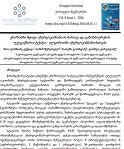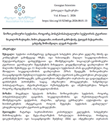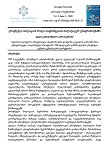Short forms of the maritime terms
Downloads
One of the Lexicographical issues of the terms are very interesting in the field terminologies, namely the rules of term organizing. In this view point the multimplicity and their short forms i.e. abbreviations are typical for the maritime terminology. Abbreviations and acronyms are most widespread linguistic forms of this phenomena. Acronym is the type of shortened word, similar to the word existing in the English language and has an appropriate meaning. Abbreviation is the conditional contraction of the word. There are many English abbreviations used in Georgian marine agreements and maritime codes, in students’ textbooks, as well as in Georgian maritime literature, here we talk only about some of them. For example:
1) There are abbreviations composed by the first letters of the terms, which are pronounced and read in an alphabetical manner. Abbreviations are written with the capital letters in English language, punctuation signs are not used with them and prepositions used in this term are not contracted in the abbreviation, for example:
VDR –Voyage Date Recorder
TSS –Traffic Separation System
CC – Compass Course
LT – Local Time
Such kind of abbreviations, as we already mentioned are pronounced separately by letters. Reading of the new terms is quite difficult for us as only the first letters of the words are presented.
2) Words composed by the beginnings of two words, for instance:
Navicert – Navigation Cetificate
Marsec – Maritime security
3) The first part is presented by a root and another one by suffix in the following example:
Bulker – Bulk Carrier
4) From two or more words, the first ones are represented by abbreviations and the last one by its full form, for instance:
MCC room – motor control center room
5) The examples of English homonyms are widely used in Georgian maritime sphere, for example:
- LT – Low tension
LT – Local Time
- BC – Birth Certificate
B.C. – Bulk Cargo
3.TA –Travel Agent
TA – Travel Agency
TA – Time of Arrival
TA – Telegraphic Address on
Here we face the double complexity as we need to choose not only a correct equivalent for the abbreviations but to find their full meanings also. Both of them are necessary in order to avoid further incorrectness and misunderstanding.
6) Combination of the first letters of the words which is pronounced as a whole word, i.e. Acronym, for example:
1.LASH – Lighter Abroad Ship
2.OBO – Ore, Bulk, Oil ship
In the maritime terminology the short forms take place in order to save place and time. Transliteration and borrowing are the methods of transferring English abbreviations into Georgian conversation. There are many examples of using abbreviations in Georgian maritime code, as there are many equivalents of the term in Georgian English abbreviation is used as an independent lexical unit. In conclusions it can be said that interest towards the working with terminology is especially growing nowadays. Results of the paper are the most important information on the vocabulary fond its perspectives and potential for the researchers interested in lexicography and study of terms.
Downloads
Ghambashidze, R. (1986). ქართული სამეცნიერო ტერმინოლოგია და მისი შედგენის ძირითადი პრინციპები. თბილისი.
Ghlonti, A. (1988). ქართული ლექსიკოლოგიის საფუძვლები. თბილისი.
Richkovi, R. (2010). რუსულ-ინგლისურ-ქართული საზღვაო ლექსიკონი. ბათუმი..
Arnold, I. V. (1973). Лексикология современного английского языка. Москва .
Bezhanovi Z. A., (2010) Guide to Maritime Eglish, Batumi.
Bobin, V. I. (2005). Терминологический справочник капитана по ведению дел и документации на английском языке. Москва.
Akmajian, A., & Demers, R. (1995). Linguistics an introduction to Language and Communication. Cambridge
Yule, G., (2006). The study of Language. Cambridge.
Fromkin, V., & Rodman, R. (2003). An introduction to Language. USA.
Oxford English Dictionary on Historical Principles (OED). (1989). Oxford University Press.
Copyright (c) 2023 GEORGIAN SCIENTISTS

This work is licensed under a Creative Commons Attribution-NonCommercial-NoDerivatives 4.0 International License.


























































































































































































































